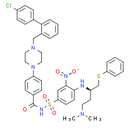Description
ABT-737 is an orally available inhibitor of the nuclear enzymes poly(ADP-ribose) polymerase (PARP) 1 and 2, with potential antineoplastic activity. Upon administration, ABT-767 selectively binds to PARP 1 and 2, thereby preventing repair of damaged DNA via the base excision repair (BER) pathway. This agent enhances the accumulation of DNA strand breaks and promotes genomic instability eventually leading to apoptosis. ABT-767 may enhance the cytotoxicity of DNA-damaging agents and reverse tumor cell chemo- and radioresistance.
Product information
CAS Number: 852808-04-9
Molecular Weight: 813.43
Formula: C42H45ClN6O5S2
Synonym:
ABT 737
ABT737
Chemical Name: (R)-4-(4-((4'-chloro-[1, 1'-biphenyl]-2-yl)methyl)piperazin-1-yl)-N-((4-((4-(dimethylamino)-1-(phenylthio)butan-2-yl)amino)-3-nitrophenyl)sulfonyl)benzamide
Smiles: CN(C)CC[C@H](CSC1C=CC=CC=1)NC1=CC=C(C=C1[N+]([O-])=O)S(=O)(=O)NC(=O)C1C=CC(=CC=1)N1CCN(CC1)CC1=CC=CC=C1C1C=CC(Cl)=CC=1
InChiKey: HPLNQCPCUACXLM-PGUFJCEWSA-N
InChi: InChI=1S/C42H45ClN6O5S2/c1-46(2)23-22-35(30-55-37-9-4-3-5-10-37)44-40-21-20-38(28-41(40)49(51)52)56(53,54)45-42(50)32-14-18-36(19-15-32)48-26-24-47(25-27-48)29-33-8-6-7-11-39(33)31-12-16-34(43)17-13-31/h3-21,28,35,44H,22-27,29-30H2,1-2H3,(H,45,50)/t35-/m1/s1
Technical Data
Appearance: Solid Power
Purity: ≥98% (or refer to the Certificate of Analysis)
Solubility: DMSO: 100 mg/mL(122.93 mM). Water: Insoluble.
Shipping Condition: Shipped under ambient temperature as non-hazardous chemical or refer to Certificate of Analysis
Storage Condition: Dry, dark and -20 oC for 1 year or refer to the Certificate of Analysis.
Shelf Life: ≥12 months if stored properly.
Stock Solution Storage: 0 - 4 oC for 1 month or refer to the Certificate of Analysis.
Drug Formulation: To be determined
HS Tariff Code: 382200
How to use
In Vitro:
ABT-737 shows low activity to Bcl-B and no effects to Mcl-1 and BFL-1. ABT-737 is sensitive to HL60, KG1 and NB4 cells with IC50 of 50 nM, 80 nM and 80 nM, respectively. ABT-737 induces apoptosis in HL60 cells, which due to decreased Bcl-2/Bax heterodimerization and has no effect on cell cycle distribution. ABT-737 also induces cytochrome c release from purified mitochondria and promotes conformational changes in Bax that are associated with apoptosis. Resistant cells (Hela and MCF-7) can be sensitized to ABT-737 by approaches that down-regulate, destabilize, or inactivate Mcl-1. ABT-737 also causes Bax/BAK-dependent cytochrome c release only when Mcl-1 has been neutralized. ABT-737 displaces Bim from Bcl2's BH3-binding pocket, allowing Bim to activate Bax, induce mitochondrial permeabilization, and rapidly commit the primary chronic lymphocytic leukemia (CLL) cells to death. Knockdown of Mcl-1 with siRNA sensitizes two resistant SCLC cell lines H196 and DMS114 to ABT-737 by enhancing the induction of apoptosis. Likewise, up-regulation of Noxa sensitizes H196 cells to ABT-737. ABT-737 inhibits proliferation and induces apoptosis in many SCLC cell lines including NCI-H889, NCI-H1963, NCI-H1417, NCI-H146 and etc. Bcl-2 and Noxa may contribute mechanistically to the cellular response to ABT-737 in NCI-H146 cells. A recent study shows that ABT-737 significantly induces apoptosis in HTLV-1 infected T-cell lines as well as in fresh ATLL cells.
In Vivo:
In aggressive leukemia model, ABT-737 suppresses the leukemia burden by 53% at the 30 mg/kg, with significantly extended survival of mice. ABT-737 does not induce significantly abnormalities in blood cell counts or serum chemistries. ABT-737 prolongs the survival of recipient mice transplanted with Bcl-2-transduced tumors. ABT-737 shows great antitumor activity in an ATLL mouse model at a dose of 100 mg/kg.
References:
- Konopleva M, et al. Cancer Cell, 2006, 10(5), 375-388.
- van Delft MF,et al. Cancer Cell, 2006, 10(5), 389-399.
- Del Gaizo Moore V, et al. J Clin Invest, 2007, 117(1), 112-121.
- Tahir SK, et al. Cancer Res, 2007, 67(3), 1176-1183.
- Ishitsuka K, et al. Cancer Lett, 2012, 317(2), 218-225.
- Konopleva M, et al. Cancer Res, 2008, 68(9), 3413-3420.
- Wade M, et al. Cell Cycle, 2008, 7(13), 1973-1982.
- Paoluzzi L, et al. Blood, 2008, 112(7), 2906-2916.
- Li R, et al. Mol Pharmacol, 2009, 75(5), 1231-1239.
Products are for research use only. Not for human use.
Payment & Security
Your payment information is processed securely. We do not store credit card details nor have access to your credit card information.


